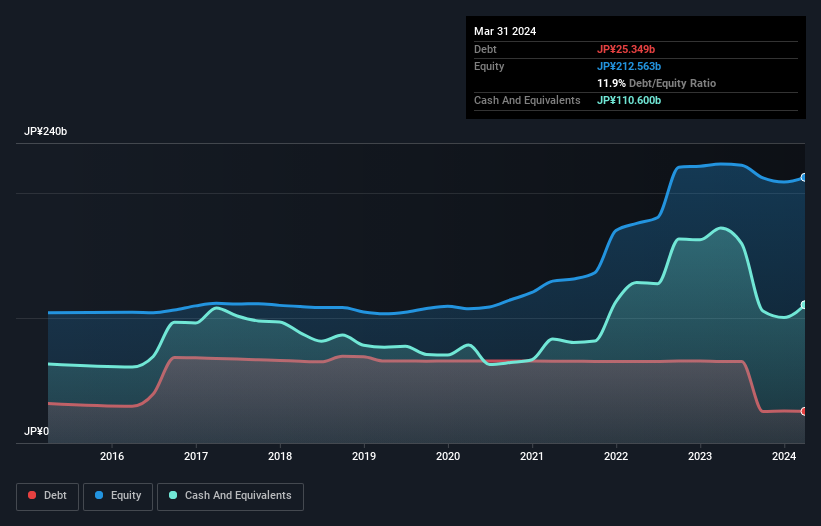The external fund manager backed by Berkshire Hathaway's Charlie Munger, Li Lu, makes no bones about it when he says 'The biggest investment risk is not the volatility of prices, but whether you will suffer a permanent loss of capital.' When we think about how risky a company is, we always like to look at its use of debt, since debt overload can lead to ruin. As with many other companies Kadokawa Corporation (TSE:9468) makes use of debt. But should shareholders be worried about its use of debt?
What Risk Does Debt Bring?
Debt assists a business until the business has trouble paying it off, either with new capital or with free cash flow. If things get really bad, the lenders can take control of the business. While that is not too common, we often do see indebted companies permanently diluting shareholders because lenders force them to raise capital at a distressed price. Having said that, the most common situation is where a company manages its debt reasonably well - and to its own advantage. When we think about a company's use of debt, we first look at cash and debt together.
Check out our latest analysis for Kadokawa
What Is Kadokawa's Net Debt?
You can click the graphic below for the historical numbers, but it shows that Kadokawa had JP¥25.3b of debt in March 2024, down from JP¥65.3b, one year before. However, its balance sheet shows it holds JP¥110.6b in cash, so it actually has JP¥85.3b net cash.

A Look At Kadokawa's Liabilities
According to the last reported balance sheet, Kadokawa had liabilities of JP¥97.4b due within 12 months, and liabilities of JP¥30.4b due beyond 12 months. On the other hand, it had cash of JP¥110.6b and JP¥65.0b worth of receivables due within a year. So it actually has JP¥47.8b more liquid assets than total liabilities.
This surplus suggests that Kadokawa has a conservative balance sheet, and could probably eliminate its debt without much difficulty. Succinctly put, Kadokawa boasts net cash, so it's fair to say it does not have a heavy debt load!
It is just as well that Kadokawa's load is not too heavy, because its EBIT was down 29% over the last year. Falling earnings (if the trend continues) could eventually make even modest debt quite risky. When analysing debt levels, the balance sheet is the obvious place to start. But ultimately the future profitability of the business will decide if Kadokawa can strengthen its balance sheet over time. So if you want to see what the professionals think, you might find this free report on analyst profit forecasts to be interesting.
Finally, a company can only pay off debt with cold hard cash, not accounting profits. While Kadokawa has net cash on its balance sheet, it's still worth taking a look at its ability to convert earnings before interest and tax (EBIT) to free cash flow, to help us understand how quickly it is building (or eroding) that cash balance. Looking at the most recent three years, Kadokawa recorded free cash flow of 48% of its EBIT, which is weaker than we'd expect. That weak cash conversion makes it more difficult to handle indebtedness.
Summing Up
While we empathize with investors who find debt concerning, you should keep in mind that Kadokawa has net cash of JP¥85.3b, as well as more liquid assets than liabilities. So we are not troubled with Kadokawa's debt use. When analysing debt levels, the balance sheet is the obvious place to start. But ultimately, every company can contain risks that exist outside of the balance sheet. For example - Kadokawa has 1 warning sign we think you should be aware of.
If, after all that, you're more interested in a fast growing company with a rock-solid balance sheet, then check out our list of net cash growth stocks without delay.
Valuation is complex, but we're here to simplify it.
Discover if Kadokawa might be undervalued or overvalued with our detailed analysis, featuring fair value estimates, potential risks, dividends, insider trades, and its financial condition.
Access Free AnalysisHave feedback on this article? Concerned about the content? Get in touch with us directly. Alternatively, email editorial-team (at) simplywallst.com.
This article by Simply Wall St is general in nature. We provide commentary based on historical data and analyst forecasts only using an unbiased methodology and our articles are not intended to be financial advice. It does not constitute a recommendation to buy or sell any stock, and does not take account of your objectives, or your financial situation. We aim to bring you long-term focused analysis driven by fundamental data. Note that our analysis may not factor in the latest price-sensitive company announcements or qualitative material. Simply Wall St has no position in any stocks mentioned.
Have feedback on this article? Concerned about the content? Get in touch with us directly. Alternatively, email editorial-team@simplywallst.com
About TSE:9468
Flawless balance sheet with reasonable growth potential.
Market Insights
Community Narratives



